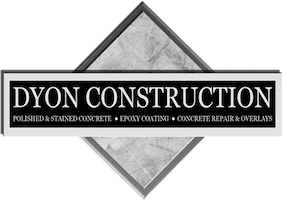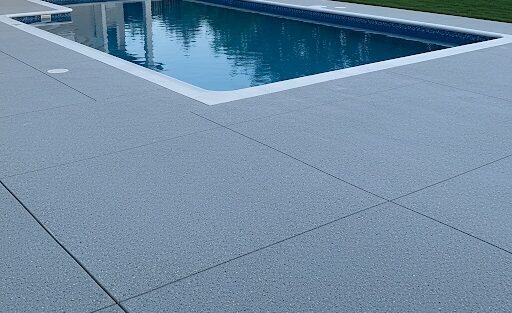A pool deck isn’t just a frame for your pool—it’s the stage for summer barbecues, sun-soaked lounging, and countless cannonballs. But over time, even the most beautiful pool decks begin to crack, fade, and show signs of wear. Instead of a complete overhaul, resurfacing is a cost-effective way to restore both function and beauty to your pool deck.
But how much does it cost? What materials are best? And what factors influence the price? Let’s dive into the costs, best options, and expert recommendations for pool deck resurfacing.
What Is Pool Deck Resurfacing?
Pool deck resurfacing is the process of applying a new surface layer over an existing pool deck to repair damage, enhance appearance, and improve safety. It’s a far more affordable alternative to demolishing and replacing the entire deck while still achieving a fresh, upgraded look.
Resurfacing can include concrete overlays, rubber coatings, stamped textures, spray finishes, or epoxy coatings—each offering its own benefits in durability, cost, and aesthetics.
How Much Does Pool Deck Resurfacing Cost?
The cost of resurfacing a pool deck typically ranges from $3 to $15 per square foot, depending on the material used, the condition of the existing deck, and labor costs in your area.
Factors That Affect Pool Deck Resurfacing Costs:
- Size of the Pool Deck – Larger decks require more materials and labor.
- Material Choice – Rubber coatings and stamped concrete cost more than basic overlays.
- Surface Preparation – Cracks, leveling, and old coatings removal can add to the cost.
- Location & Contractor Rates – Prices vary based on local labor costs and demand.
- Customization & Extras – Adding textures, colors, slip-resistant coatings, or decorative finishes increases expenses.
Comparison of Pool Deck Resurfacing Costs by Material
Resurfacing Type | Pros | Cons | Best For | Price Range (per sq. ft.) | Durability | Maintenance |
Concrete Overlay | Durable, customizable textures & colors | Can develop cracks over time | Residential & commercial pools | $3–$7 | 10–15 years | Low |
Rubber Coating | Soft, slip-resistant, comfortable on feet | Higher cost than concrete overlays | Family pools, resorts | $6–$12 | 8–10 years | Low |
Stamped Concrete | Decorative, textured for slip resistance | Requires sealing for longevity | Luxury pools, outdoor spaces | $8–$15 | 10–20 years | Moderate |
Spray Texture (Cool Deck) | Heat-resistant, affordable | Limited design options | Hot climates, public pools | $4–$9 | 10–15 years | Low |
Epoxy Coating | High-gloss, chemical-resistant | Can be slippery when wet | Modern pool designs, indoors | $5–$10 | 8–12 years | Low |
Best Pool Deck Resurfacing Options
1. Concrete Overlay ($3–$7 per sq. ft.)
✔ Best For: Residential & commercial pools needing a simple refresh
✔ Pros: Affordable, long-lasting, and customizable with colors & textures
✔ Cons: Can develop cracks over time if not properly sealed
Concrete overlays are one of the most common resurfacing options due to their affordability and durability. They can be tinted, textured, or stamped to mimic stone, tile, or wood.
💡 Pro Tip: Adding a sealant enhances resistance to moisture, UV exposure, and cracking.
2. Rubber Coating ($6–$12 per sq. ft.)
✔ Best For: Family pools, resorts, and areas needing extra slip resistance
✔ Pros: Soft underfoot, slip-resistant, and comfortable for barefoot walking
✔ Cons: Higher cost than concrete overlays
Rubber coatings are popular for safety-conscious homeowners and commercial pools. They are shock-absorbent, UV-resistant, and durable, making them an excellent choice for families with children.
💡 Pro Tip: Rubber surfaces are great for hot climates as they stay cooler than concrete or stone.
3. Stamped Concrete ($8–$15 per sq. ft.)
✔ Best For: Luxury pools, high-end residential areas, and modern outdoor designs
✔ Pros: Beautiful, customizable textures with natural stone or tile appearances
✔ Cons: Requires regular sealing to maintain appearance
Stamped concrete provides a high-end, decorative look while maintaining the durability of concrete. Homeowners can choose from patterns that replicate natural stone, wood planks, or custom designs.
💡 Pro Tip: Add non-slip sealers to enhance traction and prevent slipperiness when wet.
4. Spray Texture (Cool Deck) ($4–$9 per sq. ft.)
✔ Best For: Public pools, hot climates, and budget-conscious resurfacing
✔ Pros: Reflects heat, budget-friendly, and slip-resistant
✔ Cons: Fewer design options than stamped concrete
Spray texture, commonly known as Cool Deck, is designed to stay cooler underfoot in direct sunlight. It’s textured to improve traction, making it perfect for large public pools and backyard decks in warm climates.
💡 Pro Tip: Light-colored finishes reflect more heat, keeping the surface cooler.
5. Epoxy Coating ($5–$10 per sq. ft.)
✔ Best For: Modern pool designs, indoor pools, and high-gloss finishes
✔ Pros: Resistant to chemicals, stains, and water
✔ Cons: Can be slippery when wet
Epoxy coatings create a seamless, glossy, and modern aesthetic. They work best in indoor pools or covered outdoor pools where moisture control is needed.
💡 Pro Tip: Adding a slip-resistant additive can help prevent slips and falls.
Frequently Asked Questions
How much does it cost to redo a pool deck around a pool?
- Small pool decks (300–500 sq. ft.): $900 – $7,500
- Medium pool decks (600–1,000 sq. ft.): $1,800 – $15,000
- Large pool decks (1,500+ sq. ft.): $4,500 – $22,500
Can you resurface a pool deck?
Yes! If the existing pool deck is structurally sound, resurfacing is a cost-effective way to restore and enhance its appearance without tearing it out.
How long does pool deck resurfacing last?
Most resurfaced pool decks last 8–20 years, depending on material choice, climate, and maintenance.
Is epoxy good for pool decks?
Yes, but epoxy can become slippery when wet. If using epoxy, consider adding a textured finish or anti-slip additives for safety.
How long does pool epoxy last?
Epoxy coatings typically last 8–12 years when properly maintained and sealed.
Pool deck resurfacing is a smart investment that enhances safety, durability, and aesthetics while avoiding the cost and hassle of complete replacement. Whether you choose a simple concrete overlay, a luxurious stamped finish, or a soft rubber coating, resurfacing transforms your outdoor space into a stunning, slip-resistant retreat.
For the best results, consult a professional pool deck resurfacing contractor who can assess your deck’s condition, recommend the best material, and ensure a flawless installation.

